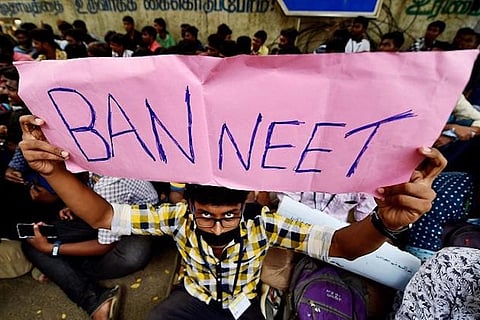

The DMK’s manifesto released on Tuesday has called for an abolition of the National Eligibility cum Entrance Test – NEET – that has in the last few years replaced every other entrance method for medical admissions across India. The AIADMK, which is in alliance with the BJP for the upcoming polls, has taken a slightly softer stand, but has nonetheless promised it’ll work for a temporary exemption from NEET for students in Tamil Nadu.
The controversial exam, because of which at least two students in TN have killed themselves, has led to several debates in the state, and as the General Elections come around the corner, NEET has clearly become a poll issue in Tamil Nadu.
Both Dravidian majors have realised that NEET is not just an exam, but a driver of public mood; it’s not an issue that can be ignored by political parties if they want the support of the people of Tamil Nadu.
Not such a NEET deal
The resentment towards NEET is a symptom of Tamil Nadu’s larger disappointment with Delhi not taking into consideration what the people of the state want.
NEET is modelled on the syllabus followed by the Central Board of Secondary Education (CBSE), thereby putting students studying a different syllabus at a disadvantage. Not only that, the 49 errors found in the Tamil NEET question paper last year points to, at best, carelessness of the CBSE, and at worst, a casual and criminal disregard for students who took the test in Tamil. Further, when the Madras High Court ordered that students who took the paper in Tamil be given grace marks for each wrong question, the CBSE immediately appealed to the Supreme Court, which overturned the HC’s order.
And in all this, the future of medical aspirants from Tamil Nadu was hanging in the balance.
The suicides of Anitha and Pradeepa have also led to public anger against NEET – and this anger, for various reasons, is directed against both the central government that pushed for NEET, and the state government which, after Jayalalithaa’s passing, neither managed to block the exam nor did enough to prepare students to take it.
A question of states’ rights
The manner in which the Centre has pushed for NEET is also symptomatic of a larger issue of centre-state relations. Education is a subject on the concurrent list, which means both the Centre and the states can take decisions regarding it. However, the fact that NEET overrides every other method of admissions, including exams by the state government, is seen as a challenge to federal powers of the states.
It is for this reason that the DMK has always stood for shifting education back to the state list from the concurrent list – a point they have reiterated in their manifesto released on Tuesday. But it’s not just a DMK demand – the AIADMK too has called for the same in their manifesto. Late TN CM and AIADMK leader Jayalalithaa had also called for education to be moved back to the states list in the past.
Between its introduction in 2013 and 2016 Jayalalithaa had in fact spoken out against the imposition of NEET, and wrote to the Centre four times expressing her objection to making the exam a mandatory requirement for obtaining a medical seat. She had even said that necessary steps should be taken to ensure that the state retained its then existing system of admissions to medical and dental colleges and requested that NEET not be implemented in the future.
However, after Jayalalithaa’s death, the AIADMK government in Tamil Nadu made several compromises to this stand.
But when it came to their manifesto, the issue could not be ignored.
Clearly, the educational ambitions of students of the state – and the growing resentment among voters about getting a better deal from the Centre – is something that no party that wishes to have a presence in Tamil Nadu can ignore. The jury is out on which of the two Dravidian parties can convince the people that they will be the ones who can protect the state’s interests.